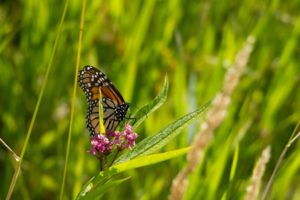The summer solstice marks the beginning of summer and here at Woodland Dunes there is new life making its way forth now that spring is over. The House Finch and Barn Swallow chicks living in the pavilion are loud and proud as they wait for mom and dad to come back with food. The purple milkweed in our Butterfly Garden has fully bloomed and awaits the arrival of Monarch butterflies.
With spring gone and summer in full swing, the native plants of Woodland Dunes are able to make their appearance. Native plants have great importance not only to the land but also to animals and insects. For pollinators, native plants are the key to survival. Native plants, such as the purple milkweed located in the Butterfly Garden, give adult butterflies a place to sip nectar as well as a place to lay their eggs on the leaves where then the caterpillars will have food and shelter in order to grow. Bees rely on native plants for food and we as humans rely on bees to pollinate these native plants. Dames Rocket is an invasive species with bright, purple flowers. It attracts bees early in the summer because of its vibrancy and early blooms. This aggressive species of wildflower uses its color to trick bees into pollinating it. This then increases the Dames Rocket population and further depletes the native plant population.
Mortality rates of butterflies and bees are increasing. Many people are unaware of this or may be unaware of the cause of this. How can we raise awareness for these essential species? As the environmental education intern, this is a question I frequently ask myself. To start, promoting awareness of how relevant and crucial native plants are to an ecosystem should be the first step. Clearing invasive species will lessen competition for native plants and will help them to fill in the vacant spaces. Planting native species that provide food and shelter for all types of wildlife will not only enhance the look of one’s garden but also the health of it.
Native plants are critical for the land and animals as well as pollinators. They provide habitat for many species of birds, shelter for many species of mammals, and nuts, seeds, and fruit for many species of wildlife. Since native plants are adapted to their local environmental conditions, they assist in the conservation of water because they require less irrigation for development and can hold more water in their roots. Because they assist in all of these wonderful things, native plants are detrimental to our ecosystems and to our climate.
Native plants have a plethora of benefits. They contribute considerable amounts of food and varying types of habitats for many species. These species of animals and insects depend on native plants for their way of life. Without these native species, ecosystems may crumble and species may become extinct. This is why awareness and appreciation for these native plants are vital to an ecosystem and deserve our full attention.
photo- monarch butterfly by Nancy Nabak

